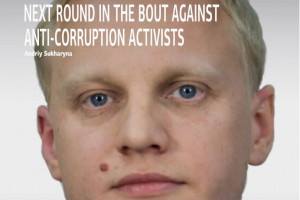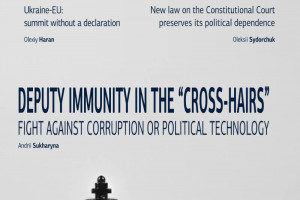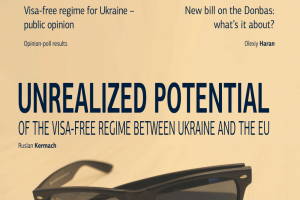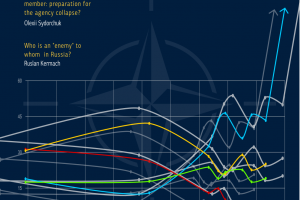•THE VISA-FREE EPIC IN UKRAINE: DID IT MISS THE EU TRAIN AGAIN? •ACTIVATION OF POLITICAL PERSECUTION IN THE POST-ELECTION PERIOD
І. Overviews of political events of the week
November |
VR Speaker Volodymyr Groysman called on the standing committee of the Verkhovna Rada to review the possibility of extending the moratorium on the sale of land for agricultural purposes. As is known, the preliminary decision on the moratorium on the sale of land was adopted in January 2013 and is in effect until January 1, 2016.
Two shots were fired at the windows of the office of Prosecutor General Viktor Shokin. The shots were fired after a press conference regarding the case of the leader of the UKROP party Hennadiy Korban was held. Fortunately, there were no victims.
November |
Monday evening and Tuesday night were tense in the zone of the Anti-terrorist Operation, the press center of the ATO reported. The report read that terrorists opened fire three times against the Ukrainian positions using rifles in the districts of Piskiv and Avdiyivka in the Donetsk oblast. At the same time, Ukrainian military forces did not open fire “in compliance with the Minsk agreements”.
Premier of Ukraine Arseniy Yatsenyuk announced the reshuffling of the government. The European subdivision of the American publication Politico published material that made a reference to Yatsenyuk, who stated that “the ministers of energy, defense and education will be sacked over the next two weeks”.
Detained leader of the UKROP party Hennadiy Korban was transported from the courtroom in Chernihiv to a temporary holding cell of the State Security Service (SBU) in Kyiv. As is known, on October 31 law enforcement bodies detained Korban. The Prosecutor General of Ukraine is suspected of forming a criminal syndicate.
November |
The Pechersk District Court in Kyiv rejected the defense of the leader of the UKROP party Hennadiy Korban regarding the challenge of investigative judge Larysa Tsokol, who is hearing the claims regarding the application of preventative measures against Korban. Proponents of Korban scuffled with the police in the Pechersk court. Press Secretrary of UKROP Yevhen Kravchuk stated that new accusations were made against Korban associated with mayoral elections in Dnipropetrovsk.
Prosecutor General of Ukraine Viktor Shokin tendered his resignation.
The second round of the mayoral elections will be held on November 15 in 29 cities across Ukraine,the press service of the Central Election Commission informed. To be more specific, the second round of elections of mayors are scheduled to be held in Kyiv and 18 oblast centers: Vinnytsia, Lutsk, Dnipropetrovsk, Zhytomyr, Uzhorod, Zaporizhzhia, Ivano-Frankivsk, Kirovohrad, Lviv, Mykolayiv, Poltava, Rivne, Sumy, Kherson, Khmelnytskiy, Cherkasy, Chernivtsi and Chernihiv.
Ex-minister of Education of Georgia Khatiya Dekonayidze was appointed Chief of the National Police of Ukraine. Minister of Internal Affairs Arsen Avakov proposed the candidacy of Dekonayidze, which President Petro Poroshenko supported.
November |
The Verkhovna Rada voted against the visa-free package of laws having passed onlytwo of the 13 required bills. In particular, the law that envisages the formation of the National Agency on the Search for and Administration of Assets received from acts of corruption and other crimes, as well as the law on certain issues regarding the foreclosure of property to avoid risks of corruption. Having adopted the Labor Code, deputies deleted from it the clause on the ban of discrimination against employees with a non-traditional sexual orientation. This raised a ruckus of discussions in the parliament. Speaker of the house Groysman closed the session and postponed the review of these laws to November 10.
The SBU detained Ex-Minister of Justice Olena Lukash in the government headed by Mykola Azarov,SBU Press Secretary Olena Hitlyanska informed. The SBU said Lukash was on an all-points bulletin “for her complicity in crimes against the Maidan”. Aside from that, she is suspected of embezzlement of state funds through abuse of power. On the website of the SBU it reads that Lukash disappeared on July 28, 2015 and in September the SBU issued a search warrant for Lukash.
November |
The Pechersk District Court of Kyiv took a preventative measure against HennadiyKorban in the form of house arrest for 2 months until December 31, 2015. Specifically, the court obligated Korban to turn in his Ukrainian and foreign passports and wear an electronic bracelet.
The Pechersk District Court arrested former minister of justice of Ukraine Olena Lukash for two months and set a bail of UAH 5.115 mn.
People’s deputy of the Opposition Bloc faction Vadym Novynskiy paid a bail for the arrested ex-Minister of Justice Olena Lukash, whose defense attorney Andriy Smirnov confirmed that the money has been transferred to the appropriate treasury bank account, meaning that the ex-minister will soon be released from her temporary holding cell.
The withdrawal of armaments from the Donbas region should be completed by early December, the heads of the Ministry of Foreign Affairs of Ukraine and the Normandy Four agreed at their meeting in Berlin. In addition to that, in 2016 elections are scheduled to held in the territories controlled by pro-Russian military forces.
THE VISA-FREE EPIC IN UKRAINE: DID IT MISS THE EU TRAIN AGAIN?
The events of last week have all the chances of being the last and successful step towards the start of preparations of the European Union to a positive decision in granting Ukraine a visa-free regime. However, a number of important bills were not passed by the Ukrainian parliament in the form that meets the requirements of visa-free dialog with the EU. What stands behind these political passions? And most importantly, what does this mean for Ukraine being granted a visa-free regime?
Failure of anti-discrimination norms: is it a hostage of manipulation?
In truth, the parliament of Ukraine was faced with a fairly simple task the execution of which was mandatory. The first task was voting in favor of the anti-discrimination amendment to the labor legislation in order to render harassment of sexual minorities on the work place impossible. The second task was to introduce mechanisms for the redemption of assets that were illegally acquired through corrupt schemes. In Ukrainian version this meant creating a special National Agency and granting it the corresponding authority. The parliament failed to cope with these tasks.
So what is the main problem? On the one hand, the anti-discrimination amendment became victim mainly of political manipulation of deputies. On the other hand, this was due to the irresponsibility of the political scenario on the whole. The need to introduce this norm to labor legislation was long ago understood as a mandatory requirement to Ukraine’s visa-free regime plan. The Ukrainian side did not put forth this issue point blank and did not formally insist on lifting these obligations of Ukraine during negotiations.
There was probably a hope for a compromise – either “meeting half way” or Ukraine ignoring this norm and expectation of a calm reaction of the EU. However, the compromise could have only been reached in one way: Ukraine immediately approves the Labor Code not in its final version, but only in its first reading that contains the obligatory anti-discrimination amendment. In such a case, this is an “advance” counting on Ukraine that this norm will remain in the second reading of the bill.
There could not have been any other compromises in the last stage of the second phase of visa liberalization. Nevertheless, this norm was not simply absent in the draft of the Labor Code as only 117 of the 226 required votes were gained in order to review the possibility of the adoption of this amendment in the future. Moreover, all factions and groupings in the Ukrainian parliament are without exception responsible for this. In the pro-presidential Petro Poroshenko Bloc faction alone more than half of its members voted in favor of the possibility of reviewing this provision, though this accounts for only 78 deputies of 142. In all other groups and factions, including those members of the coalition that were “in favor” of the amendment or did not appear at all or they ended up in the absolute majority. Overall, the level of political speculation on this topic has reached such a point that voting ”calmly” is not likely to be achieved. Indeed, one of the political forces would definitely continue to manipulate and win electoral bonuses on this wave. However, members of coalition whose aim was European integration should clearly have supported the necessary amendment to the visa-free regime.
Anti-corruption laws: once again not on time?
The bills on the procedure of management and return of illegal transfer of assets are an even more heated subject. The conflict around this fiasco was not a consequence of manipulation and gaining the sympathy of the electorate as in the case of anti-discrimination. There are two factors that are quite obvious in this fiasco – namely, institutional and political. The institutional factor is weak coordination and potential conflict along the lines of relations between the government and the parliament (even the parliamentary majority). The political factor is the quality of work of the deputy corps. Indeed, one of the parliamentary committees through which the bill on the new National Agency was supposed to be passed in the second reading did not gain a quorum over several weeks and on the last day prior to voting in the parliament completely changed the content of the bill. In fact, it amended it to the point that the Ministry of Justice officially made public its appeal against such amendments.
Although there were many speculations of mechanisms and powers of the new National Agency, this situation is more political and unofficial in nature regarding the introduction of anti-corruption reform. It seems that this is simply one of the puzzles in the complicated history of the formation of a system of the fight against corruption in Ukraine. Indeed, recall the most recent conflict that de-facto arose during the opposition of the Prosecutor General’s Office to execute its part of the visa-free “homework” so that it would not raise doubts in the EU or the Ukrainian expert community. The conflict that drew in the Ministry of Foreign Affairs of Ukraine and the EU Representative Office in Ukraine was overcome through a compromise, though at the same time new obstacles to independent and impartial persecutions and the work on anti-corruption issues were put up in the parliament. In other words, generally speaking the system of Ukraine fulfilling its obligations to this day depend on political interests of certain players, poor coordination between different departments and vain expectations that the EU will simply turn a blind eye to these and other “failures.
What’s next? Are there chances to rectify the situation by the end of this year?
The main problem regarding all these battles in parliament over the visa issue is the fact that are happening at the last moment. The technical and non-public decision for which the European Commission is preparing its conclusion regarding Ukraine in December should be approved in Brussels on November 10, either positive (introduction of a visa-free regime) or negative (continuation of Ukraine’s fulfillment of its obligations). The only chance for Ukrainian parliamentarians to jump on the caboose is to vote in favor of the bill on November 10 that failed the previous week. Theoretically, this is possible. But practically it requires the readiness to vote, meaning deputies must make a political decision to renounce their public positions that were voiced several days earlier. The chances that this will happen are in truth slim to none.
Be that as it may, it is worth noting that this is not a fiasco of dialog regarding the visa-free issue. Ukraine will still be obligated to do its homework, but what is important here is not the technical side of the issue, rather the political aspect. The situation in the Verkhovna Rada only undermined the trust of the EU in its Ukrainian partners. The actions of Ukraine’s parliamentarians clearly contradict the fact those who are mainly members of the coalition declare integration with the EU a priority for Ukraine. Herein lie the main risks that could have serious repercussions not only on the visa-free, but in general the political dialog between Ukraine and the EU. There is currently a political will of EU member countries to grant Ukraine the benefits of a visa-free regime. Moreover, the entire visa-free process remains in the technical plane and depends only on when Ukraine completes its homework in full. However, the
But the “rabbits that Ukraine’s parliamentarians pulled out of their hats” this past week increases the risks that Ukraine must try to minimize. The issue is about the political component of the visa-free regime. The more that the Ukrainian side tries to drag out the fulfillment of its obligations, the political approach will be more significant than the technical approach not even on the part of the EU, but that of its member countries. This could affect the agreement on a visa-free regime with Ukraine by law enforcement bodies of EU member countries and the overall attitude towards the support of Ukraine, particularly in light of the Russian-Ukrainian conflict.
Of course, the European Union could meet half way with Ukrainian diplomats. Specifically, the decision on the report of the Ukraine’s progress may be approved and made public somewhat later than in December. Then the Ukrainian side will have additional time to resolve all domestic issues and show concrete results rather than having to explain why there are no such results. In light of the aforementioned, such a variant of the development of events looks more than realistic. It appears that Ukrainian diplomats will be forced to work on November 10 to lobby such a decision regarding the postponement of submitting their report.
Conclusions
The inability of the parliament of Ukraine to approve several “visa-free laws reveals a number of “diseases” of the Ukrainian political system. But this does not mean that the doors to a visa-free regime are closed for Ukraine, though it turns out that additional obstacles along this path are being artificially and irresponsibly put up. Despite this, it must be understood that the main consequences of such actions on the part of the Ukrainian side are not a routine delay in the introduction of a visa-free regime, rather an attempt to earn the political trust of the EU. The dialog regarding a visa-free regime is one of the litmus paper tests for the EU regarding the events in Ukraine and to what degree the Ukrainian government is prepared to undergo systemic changes.
ACTIVATION OF POLITICAL PERSECUTION IN THE POST-ELECTION PERIOD
On the morning of October 31 unexpected news that the law enforcement bodies of Ukraine detained a close colleague of the renowned Dnipropetrovsk oligarch Ihor Kolomoyskiy and leader of the ‘UKROP’ party Hennadiy Korban was made public. Later the Prosecutor General’s Office of Ukraine and the State Security Service (SBU) informed that Korban was detained du
ring a special operation with the aim of liquidating an organized crime syndicate. A few days after Korban’s resounding detainment Prosecutor General Viktor Shokin announced the intentions of the investigators to question MPs of the ‘Opposition Bloc’ Vadym Novynskiy, Oleksandr Vilkul and Natalia Korolevska. Alongside the questioning of deputies of the ‘Opposition Bloc’ ex-Minister of Justice Olena Lukash, who was accused of misappropriation of state funds through abuse of power, was also detained.
Can one speak about the political composite of the current persecutions?
What political motives are behind the main activation of criminal
persecutions and questioning of political activists in the post-election period?
Perhaps In light of the totally justified accusations against Hennadiy Korban and then Olena Lukash from the legal vantage point, the fact of such turbulent activation of the law enforcement activity of the Prosecutor General’s Office of Ukraine and the SBU exactly at this stage can only incite logical suspicion among broad circles of the Ukrainian public. Avoiding interpretation of the current persecutions beyond the political context is quite difficult and there are solid grounds for this assumption.
First and foremost, as is known from certain sources close to the PGO, a number of criminal cases have already been opened earlier against Korban, who is rather known for his raiding activities that law enforcement bodies for some reason did not investigate before. The detainment of Lukash almost two years after she no longer worked as the minister of Justice of Ukraine under the presidency of Viktor Yanukovych also seems quite strange.
A no less weighty factor that casts doubt on the impartiality and political non-engagement of the Ukrainian law enforcement system is the obstinate ignoring by the Prosecutor General’s Office of the already opened (in two European countries) criminal proceedings on the close ally of the current Prime-Minister and the MP from the ‘People’s Front’ party Mykola Martynenko, the scandalous flight of people’s deputy Serhiy Klyuyev accused of swindling huge amounts of money and a number of other resonant cases that seriously discredit the current leaders of Ukrainian law enforcement bodies.
It is worth noting that after the detainment of leader of the ‘UKROP’ party Hennadiy Korban gained tangible publicity in Ukraine on the backdrop of accusations against the government of selective justice and political repression, Prosecutor General Viktor Shokin boldly announced the plans of the PGO also to question the current MPs of the ‘Opposition Bloc’ Vadym Novynskiy, Oleksandr Vilkul and Natalia Korolevska that was supplemented by the detainment of ex-Minister of Justice Olena Lukash. One can see with a naked eye in such aspirations a clear attempt of the subordinated to the president PGO and SBU to temper the wave of accusations of the selectivity of the current system of justice and convince the public of the opposite.
Activation of criminal persecution in the post-election period could be dictated by a number of political motives. First and foremost, the public nature of the current detainments may be an attempt of the leadership of the discredited Prosecutor General’s Office to prolong its tenure and at the same time distract the public from negative information and criticism that continue to be addressed towards the current head of the PGO Viktor Shokin. For example, recently U.S. Ambassador to Ukraine Geoffrey R.Pyatt harshly criticized the Prosecutor General’s Office of Ukraine for “undermining reforms and defending corrupt prosecutors”, while European officials in their turn noted the dubious nature of members of the commission in the appointment of the anti-corruption prosecutor delegated by the current PGO. So, the public political detainments that the PGO is actively conducting now smack more of institutional self-preservation of the leadership of the government agency and most likely are called on to compensate the deficiency of quality structural reforms in the law enforcement system of Ukraine.
Together with the purely institutional motive of the Prosecutor General’s Office the resonating detainments and threats of their continuation against representatives of different political forces could be easily dictated by more strategic goals associated with the need of the president in maintaining the current parliamentary coalition, which after the local elections could further erode as a result of the strengthening of the electoral positions of certain political forces registered in those elections (e.g. ‘Batkivshchyna’). In this context, the threat of application of the law enforcement lever regarding high-standing officials could be an instrument of indirect “disciplining of the political elite” and influential oligarchs standing behind some of the political parties in Ukraine.
In this case the issue is not only about the parties and deputy factions represented in the current parliamentary coalition. The need to achieve positive results in the course of future voting for the Law “On Changes to the Constitution of Ukraine in the Chapter on Decentralization”, which is important for the president, will require the support of a minimum of two-thirds of the total composite of the deputy corps (300 votes), which will clearly require the accumulation of votes of deputies who are not part of the current parliamentary coalition.
However, the continuation of politically motivated selective persecution on the part of the PGO and the SBU could easily backfire on the government. In the event of the absence of sufficiently convincing evidence of accusations regarding detained individuals for the public it can be anticipated that the current governmental authorities will be subject to even harsher criticism, in particular, for the political repression. At the same time, politically motivated justice could become the factor of formation of a powerful inter-party anti-presidential wing of opposition, which could have long-term repercussions for the current representatives of the government in Ukraine.
Conclusions
So, the inconsistent and fairly chaotic nature of the recent criminal persecutions of current and former political activists creates substantiated grounds to doubt the impartiality and absence of political motives in the actions of the law enforcement bodies of Ukraine that are accountable to the president. Moreover, the political motives of activation of political justice could comprise a fairly broad spectrum of goals of different levels, starting with the institutional self-preservation of the leadership of the Prosecutor General’s Office of Ukraine and attempts to create a favorable information background for the institution that today is headed by Viktor Shokin and is sharply criticized for the blockage of structural reforms in the law enforcement system, and ending with the ambitions of the president to indirectly impel parliamentarians of different factions and deputy groups to support in the nearest future the presidential initiative on decentralization under the threat of further persecution.
“Focus оn Ukraine” – weekly informational-analytical news bulletin prepared by the Ilko Kucheriv Democratic Initiatives Foundation (http://dif.org.ua).
DIF Analysts:
Iryna Bekeshkina
Oleksiy Haran
Ruslan Kermach
Oleksiy Sydorchuk
Maria Zolkina
Editor-in-chief: Iryna Filipchuk








